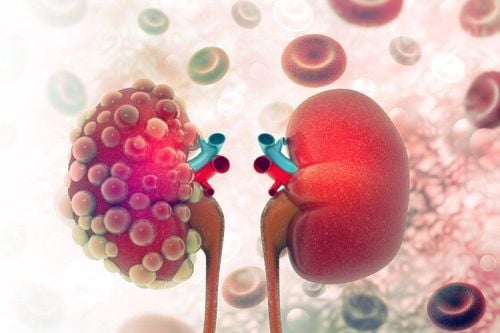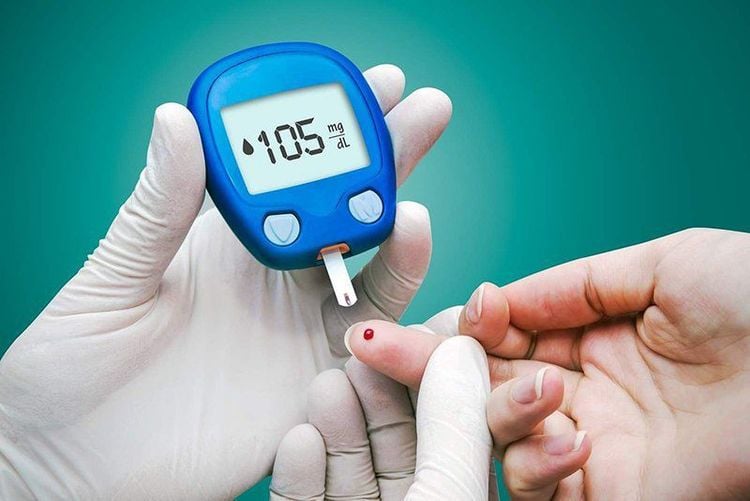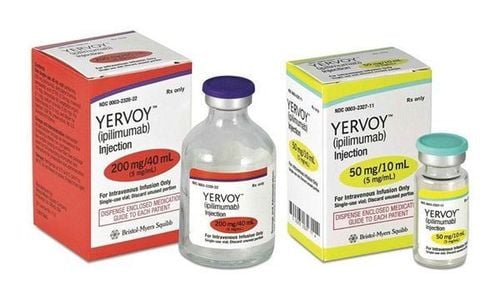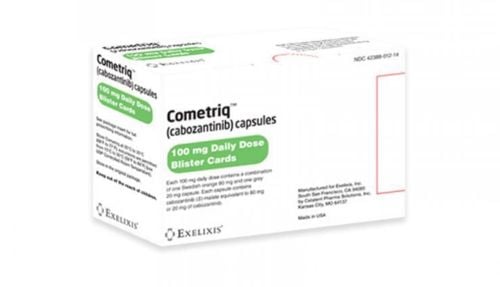This is an automatically translated article.
Temsirolimus is used in the treatment of kidney cancer. Temsirolimus works to slow or stop the growth of cancer cells.1. Indications and contraindications of Temsirolimus
Temsirolimus drug is indicated in the treatment of:Renal cell carcinoma Temsirolimus drug is contraindicated in the following cases:
Severe infection Brain cancer Cancer metastasis to the brain Diabetes Too much fat in the blood Stroke Interstitial pneumonia Liver disease Reduced kidney function High levels of bilirubin in the blood Slow wound healing Pregnancy Pregnant women Stomach or intestinal wall rupture Right before, during and after surgery
2. How to use Temsirolimus
Temsirolimus is given intravenously by a healthcare provider. It is usually given once a week (for 30 to 60 minutes) or as directed by your doctor. The dose of Temsirolimus is calculated based on your medical condition, interacting drugs, and response to treatment.Your doctor may direct you to take another medicine (for example, Diphenhydramine) before injecting Temsirolimus to help prevent side effects (infusion reactions).
Use Temsirolimus regularly to get the most benefit from it. To help you remember to take your medication, mark the days on the calendar when you need to get it.
Laboratory tests and/or medical exams (such as complete blood count, cholesterol/triglyceride level, blood glucose level, liver function, kidney function, chest X-ray, urinalysis ) should be taken before you start using Temsirolimus and while you are using it.

Thuốc Temsirolimus được sử dụng trong điều trị ung thư thận
3. Side effects of the drug Temsirolimus
While using Temsirolimus, you may experience pain or sores in your mouth or throat, nausea, vomiting, diarrhea, headache, changes in appetite, weakness, and loss of appetite. If these side effects of Temsirolimus last or get worse, tell your doctor right away.People using Temsirolimus may have serious side effects. However, your doctor has prescribed you this medicine because he or she has judged that the benefit to you is greater than the risk of side effects. Careful monitoring by your doctor can reduce the risk of side effects.
Tell your doctor right away if you have any serious side effects of Temsirolimus, including: Flushing, slow wound healing, ankle/feet swelling, red or itchy eyes , easy bruising or bleeding, unusual tiredness, muscle cramps, heart palpitations, pain/redness/swelling of hands or feet, missed period, menstrual pain.
Temsirolimus may decrease your ability to fight infections, make you more likely to get a serious infection, or make any infection you already have worse. If you have any signs of an infection, tell your doctor right away.
Temsirolimus may increase cholesterol/triglycerides or blood sugar. You may be asked to have your cholesterol/triglycerides or blood sugar checked periodically. You may need medication to control cholesterol/triglycerides or blood sugar. Tell your doctor or pharmacist if you experience symptoms of high blood sugar, including increased thirst/hunger, frequent urination.
Temsirolimus can rarely cause serious (rarely fatal) lung, kidney or bowel problems. Tell your doctor right away if you notice any symptoms of lung, kidney, or intestinal problems, including: Shortness of breath, rapid breathing, cough, change in the amount of urine, urine foamy, severe abdominal pain, black/bloody stools.
Temsirolimus increases the risk of a potentially fatal brain infection (PML - progressive multifocal encephalopathy). Tell your doctor right away if you have any of the following symptoms: Clumsiness, sudden changes in thinking (such as confusion, trouble concentrating), difficulty moving muscles, seizures, trouble speaking .
Usually, a very serious allergic reaction to Temsirolimus can occur. Get medical help right away if you have any of these symptoms of a serious allergic reaction: rash or flushing, itching or swelling (especially of the face, tongue, or throat), severe dizziness , chest pain, difficulty breathing.
Temsirolimus can cause a mild rash, but it's usually not serious. However, you should still seek immediate medical help if you develop any rash.
Below are Temsirolimus side effects by likelihood.
Common side effects of Temsirolimus include:
Infections High levels of triglycerides in the blood Too much fat in the blood Low levels of phosphates in the blood Low blood potassium levels The body's ability to fight infections is impaired. blood Thrombocytopenia in the blood Low level of white blood cells Low level of neutrophils High blood pressure Common cold stomatitis Urinary tract infection Fever Visible fluid retention Shortness of breath Chest tightness High blood sugar Control abnormal liver function test Anaphylactic shock Congested and runny nose Constipation Acne Dry skin Joint pain Back pain Difficulty sleeping Pain Chills Loss of taste Temporary redness of the face and neck Loss of appetite Weight loss Cough Nausea Vomiting Vomiting Diarrhea Stomach cramps General weakness

Trong quá trình sử dụng thuốc Temsirolimus, bạn có thể bị nhức đầu, buồn nôn
Diabetes Depression Thrombophlebitis due to blood clots Formation of blood clots in veins Pneumonia Draining fluid into the lungs Stomach or intestinal bleeding Lung tissue problems Pink eyes Nail disorders Muscle pain Slow wound healing Rare side effects of Temsirolimus include:
Pneumonia caused by the fungus Pneumocystis Jiroveci Pericardial fluid Low blood pressure Blood coming out of the anus An internal hole intestine Gallstones Cholecystitis Nephrotic syndrome Acute renal failure Stevens-Johnson syndrome Rhabdomyolysis Convulsions Respiratory arrest Angioedema Drug hypersensitivity reactions Pancreatitis Sepsis Increased protein in urine injection site Injury to the skin and tissue around the injection site. This is not a complete list of the possible side effects of Temsirolimus. If you notice other side effects of Temsirolimus medicine not listed above, contact your doctor right away.

Bệnh tiểu đường là một trong các tác dụng phụ ít gặp của thuốc Temsirolimus
4. Measures to prevent side effects of Temsirolimus
Before receiving Temsirolimus, tell your doctor if you are allergic to it; or sirolimus and any other allergies if present. Temsirolimus products may contain ineffective ingredients that may cause allergic reactions or other problems.Before using Temsirolimus, tell your doctor or pharmacist your medical history, especially of: Diabetes, high cholesterol/triglyceride levels, liver disease, kidney disease, recent/current wounds or infections, Recent surgery, brain cancer.
Temsirolimus may make you more susceptible to infections or may worsen any infections you already have. You need to avoid contact with people who have an infection that can spread to others (such as chickenpox, measles, flu).
Do not have any vaccinations/vaccinations during treatment with Temsirolimus, without your doctor's consent.
Before surgery, tell your doctor or dentist that you are being treated with Temsirolimus.
There may be pain or sores in the mouth and throat when using Temsirolimus. Brush your teeth gently and carefully, avoid using mouthwash that contains alcohol, and rinse your mouth often with cool water mixed with baking soda or salt. And it's best to eat soft, moist foods.
Temsirolimus is not recommended for use during pregnancy, because it can harm the unborn baby. It is recommended that both men and women taking Temsirolimus use reliable forms of birth control (eg, condoms, birth control pills) during treatment with Temsirolimus and for at least 3 months afterwards. Tell your doctor if you are pregnant or think you may be pregnant, or if your partner becomes pregnant while taking Temsirolimus.
We do not know if Temsirolimus passes into breast milk. Because of the possible risk to the infant, breast-feeding is not recommended while using Temsirolimus and for 3 weeks after stopping treatment.

Không nên cho con bú trong khi sử dụng thuốc Temsirolimus
5. Temsirolimus drug interactions
Drug interactions can change the way Temsirolimus works or increase your risk of serious side effects. Tell your doctor about all the prescription drugs, over-the-counter medicines, and herbal products you use. Do not start, stop, or change the dose of any medicine while using Temsirolimus, without your doctor's approval.Some products that may interact with Temsirolimus include: ACE inhibitors (such as benazepril, lisinopril), "blood thinners" (such as warfarin, enoxaparin), other drugs that weaken the immune system or increased risk of infection (eg, cyclosporin, natalizumab, rituximab, tacrolimus), sunitinib.
Other drugs may affect the removal of temsirolimus from your body, which may affect how temsirolimus works. Such drugs include azole antifungals (such as itraconazole, ketoconazole, itraconazole), enzalutamide, macrolide antibiotics (such as clarithromycin, erythromycin), mifepristone, HIV and HCV protease inhibitors (such as indinavir, ritonavir, telaprevir compin) , rifabutin, rifamabutin ), St. John's wort, some other drugs.
Temsirolimus is very similar to sirolimus. Do not use medicine containing sirolimus while using temsirolimus.
6. What to do if you overdose or forget to take Temsirolimus?
Symptoms of Temsirolimus overdose may include: Convulsions, mental/mood changes, trouble breathing. If you or someone else has overdosed on Temsirolimus and has severe symptoms such as fainting or difficulty breathing, call 911 right away.To get the best benefit, you need to receive each dose of Temsirolimus on the prescribed schedule. If you miss a dose of Temsirolimus, contact your doctor to set up a new dosing schedule.
Please dial HOTLINE for more information or register for an appointment HERE. Download MyVinmec app to make appointments faster and to manage your bookings easily.
Reference source: webmd.com












